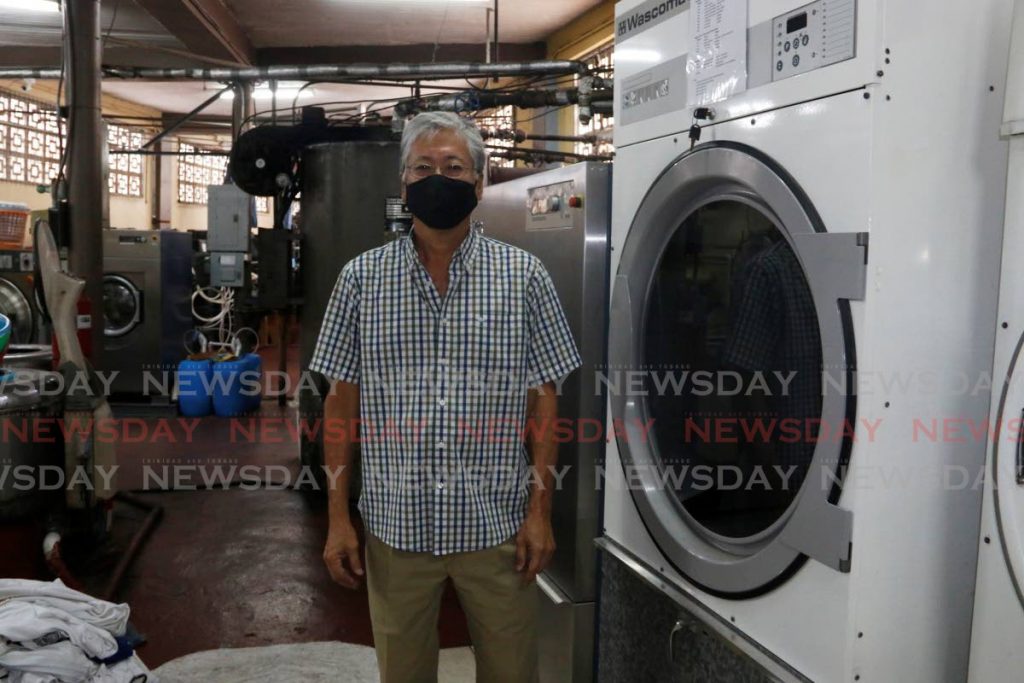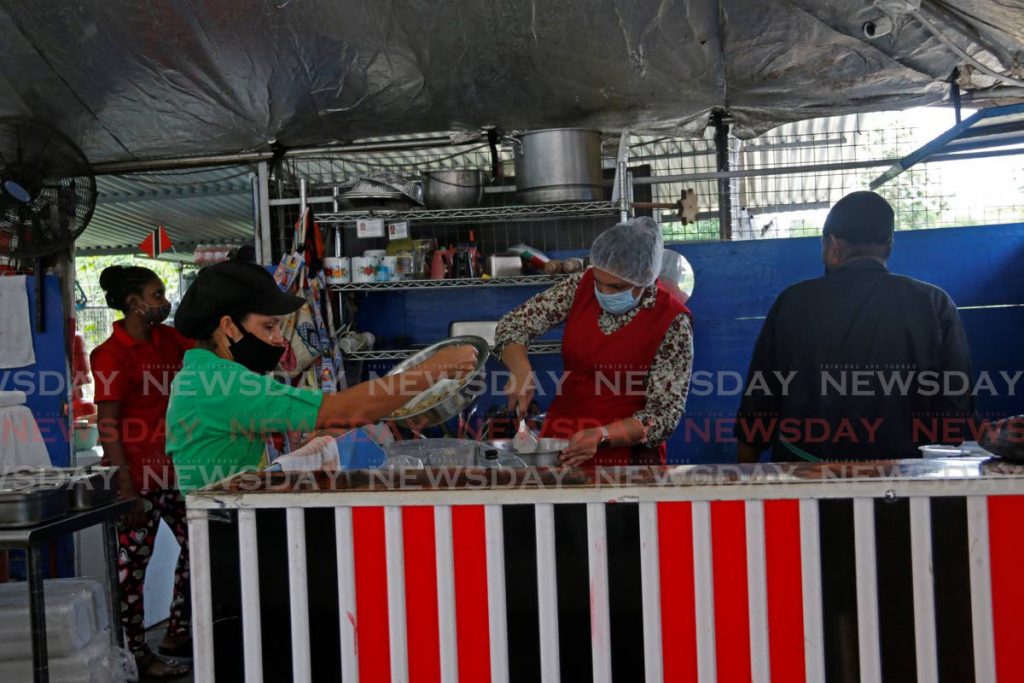Survival of the fittest in Pointe-a-Pierre

With the budget expected on Monday, many people are wary about any hits to their income and livelihoods, already reeling from sustained economic hits, including the covid19 pandemic. With a projected deficit between $15 billion and $20 billion, Finance Minister Colm Imbert has noted that fiscal 2021 will be exceptionally difficult.
For the people of Pointe-a-Pierre, the closure of the community's lifeblood, the Petrotrin oil refinery, two years ago has already destabilised its already shaky economic growth and residents are anxiously awaiting Government's plans to kickstart development.
Covid19 has been largely blamed for the additional hardships, including a short-term shift in priority to immediately battling the effects of the virus – both health-wise and economically – meaning any plans to create new infrastructural projects have been but on hold, including the La Brea drydock and the Point Lisas tech park, which were supposed to absorb the excess capacity in south Trinidad after Petrotrin's closure.
Imbert in Monday's pre-budget forum, the Spotlight on the Budget and Economy, held at the Hyatt Regency, Port of Spain, said Government understood the seriousness of the situation and the decisions to be made.
A community in limbo
The area north of San Fernando and south of Claxton Bay was highly dependent on the Petrotrin oil refinery. When the refinery, which had been operating for 101 years, was closed in 2018, it led to the direct loss of almost 5,500 jobs.
Bordered by communities such as the Naparimas, Marabella and Gasparillo, hundreds of livelihoods, including small and medium enterprises (SMEs) – from restaurants to energy services companies – were also affected.
A stalwart in the community of Marabella, Gregory Akin Thong said things have not been the same and people continue to struggle to make ends meet. He is the owner of Chee’s Laundry and Dry Cleaners, which has been in operation for the past 34 years, located along the Marabella Main Road.

Thong said his business, like many others, has taken blows from all sides, starting with the closure of some plants on the Point Lisas Industrial Estate. With the closure of the Petrotrin oil refinery and the restrictions brought on by the covid19 pandemic, his business faced additional damage and he was concerned about its survival.
He said: “We are now operating at below 50 per cent capacity and have had to restructure our work schedules to ensure that all staff have some form of income. While we operate six days for the week, we had to split the work crew into two groups in order to keep them all employed. There are 14 people here.”
Thong explained that the nearby communities, especially Marabella, which lies closet to the defunct refinery, now seem "like a ghost town.”
“The community has been dismal since Petrotrin closed down. On the very odd day it could be a little better than a ghost town. The hope of increased financial activities in the communities is slim and like many others. I am hoping that Petrotrin is revived.”
MP for Pointe-a-Pierre, David Lee, said the people in the community and nearby areas have been heavily burdened and continue to struggle given the state of the economy, which has worsened with the closure of the refinery and degeneration of Point Lisas.
“One must understand that Pointe-a-Pierre has depended heavily for employment and support from the refinery and Point Lisas Industrial Estate. Covid19 is now making things much worse and placing many more into poverty," he said.
“Since the closure of Petrotrin, thousands have lost their jobs, especially in the Battoo Avenue area in Marabella, as well as Claxton Bay. There has been a sense of hopelessness throughout the community as many people, especially young men, who have been unable to maintain their families, pay rents and provide other necessities which have led to many domestic issues in their home life. Many young, skilled individuals who once worked with Petrotrin have not been able to find jobs in other industries as promised, such as the La Brea dry dock project or San Fernando Waterfront project.”

Lee, the UNC candidate who was re-elected on August 10, agreed with his constituents and explained that fenceline businesses were barely holding on. He claimed that the support promised by the Government in the 2019 budget never materialised.
“Today, the final nail in the coffin is being placed for many with covid19 pandemic, as many have not been able to access the business relief grants which were promised,” he said.
Ripple effects of pandemic
Across the Sir Solomon Hochoy Highway and into Gasparillo, small businesses owners and workers also explained that their revenues, standard of living and overall livelihoods have decreased.
Trini Choka, located on the Gasparillo Main Road, said their operations have slowed since Petrotrin’s closure, but it has become worse due to the covid19 pandemic.
Saira Khan, a worker at the food stall, said, “We had to cut staff by half and have also had to change our working schedule. We opened in the afternoon until maybe 10 or 11 at night. This model had to change and now we open practically all day into late night in order to make something.”

A nearby vegetable vendor, Clyde Sooknanan, operating not too far from the Gasparillo junction believed the current economic climate was not to be blamed on Petrotrin’s closure but rather the pandemic and its accompanying restrictions.
Clyde Sooknanan, who also owns New York Styles clothing store on Gasparillo junction, said, “People blaming it (the poor economic situation) on Petrotrin, but Petrotrin had nothing to do with this. Most of the time, the community and community life are down. I would say about 80 per cent of the businesses here are struggling and on the verge on collapsing.”
And as the budget nears, president of the Gasparillo Chamber of Commerce Anil Ranjit said the organisation hoped and recommended that Government pump some type of liquidity into the SMEs in the surrounding communities.
He said they were hit with a double blow and their recovery seems far-fetched at this point.
Ranjit said, “In order for these businesses to survive there needed to be some cash injections into the businesses. The problem is that people do not have money to spend at this point in time.
“The closure of Petrotrin hit us hard. The food industry took a hard hit.”
Ranjit said many people feared further decreases in incentives and social help, as well as increases in taxes and the introduction of new taxes such as the property tax.
He said Petrotrin was their lifeline and while there have been talks about the sale of the refinery to Oilfield Workers’ Trade Union (OWTU), the idea of such a transaction seemed to only be an election gimmick.
“I think that was just a farce for the general election. Nothing came out of it because right after elections we heard nothing about it again. I hope and wish they could restart the refinery.

“It would save on foreign exchange where we are buying fuel and then we could generate foreign exchange with sales. Plus, it would generate incomes and at least 50 per cent of the previous employment load could be re-hired. Something good could happen if it restarts,” Ranjit said.
He urged Government to stop doubting that the energy sector is in trouble and called on Minister of Energy and Energy Affairs Franklin Khan to step out of his comfort zone and tackle the problem strategically.
Ranjit said, “We have so many closed plants and a few plants are running idle. We are on the verge of being de-industrialised because our last negotiated gas price was exorbitant. We now have serious competition in the market as Guyana and Suriname emerge in the energy sector. While Minister Khan is saying the energy sector is okay, the facts are saying that it is not so, and it does not look good.”
Finding hope in Patriotic
In 2019, after a US$700 million bid for the Guaracara Refinery Co Ltd and the Paria Fuel Trading Co Ltd, the Oilfield Workers' Trade Union won the tender own and operate the refinery.
The acquisition for closure is yet to be completed and OWTU leader Ancel Roget post-election 2020 in a series of media conferences expressed frustration over government’s delay in signing off the agreement before the August 10 general election.
But, the Prime Minister, at the Spotlight conference Monday, stated that the OWTU’s Patriotic Energies and Technologies Co Ltd had until the end of October to settle on negotiations for the acquisition of the Petrotrin refinery.
Dr Rowley said based on contractual obligations, a response was expected by the date that was set and if this was not done then other options would be looked at.
In this latest development OWTU’s chief education and research officer Ozzi Warwick said they welcomed the announcement by the PM and the union was ready to conclude negotiations.
Warwick told Business Day that they were calling for the closure of the acquisition for a long time to prevent negative impacts on the economy, especially in south Trinidad.
He said, “We were always treating this issue with a certain level of urgency. We held several press conferences to highlight the issue and the need to move to close the acquisition process.”
Warwick said Patriotic brought hope for a brighter future to the dependants of the defunct refinery.
“When Patriotic was selected as the preferred bidder there was a lot of national support by citizens because it captured their imaginations, and they began to feel a sense of hope. Once work begins at the refinery there will be precious foreign exchange coming into the country because there will be several phases of work like the inspection, turnarounds and preparation for the actual restart of the refinery,” Warwick said.
He noted that significant revenue generation will be available, as well as the creation of hundreds of jobs.
Warwick said, “It will definitely attract taxes for the state in terms of custom duties and capital goods, the green fund levy and so on. It will create demand, it will create jobs – almost 5,000 jobs in the immediate short-term. We need that because when people have disposable income in their hands, they can at least engage in the economy in way that can stimulate economic activity.”
Other important elements in the recovery of the economy, Warwick explained, was to be an independent producer of fuel, given the challenges internationally, including low demand and supply chain disruptions, which have been further crippled by the pandemic.
“Fuel security is important. When you think about the geopolitical tensions, you do not want to be completely dependent on importing fuel. You want to be able to produce your own fuel so we can ensure there is a high level of fuel security,” Warwick said.
MP Lee also said the reopening and restarting of the refinery would not only provide much needed jobs but also enhance social development in the Pointe-a-Pierre area.
He said, “The best way to enhance economic growth in Pointe-a-Pierre is to firstly reopen the refinery which will provide jobs to the many skilled workers, but it would also spur on fence line businesses.
“The second factor would be to revitalise Point Lisas by renegotiating proper natural gas prices for down-streamers so they can get their plants running again, thereby providing jobs once more for the constituency.”
Job opportunities, unemployment, crime, poor roads, lack of proper drainage, lack of school maintenance and timely distribution of relief grants were some of the challenges that can be addressed through equitable funding from the government.
Lee added that more incentives were also needed in the energy sector to encourage competitiveness, increased exploration, production and downstream growth.

Comments
"Survival of the fittest in Pointe-a-Pierre"